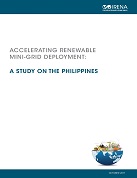Accelerating renewable mini-grid deployment: a study on the Philippines
 Consultations in the Philippines have called for “establishing an enabling environment for mini-grids” to expand energy access and increase national energy security based on renewable sources and technologies. This study makes five main recommendations to accelerate the development of renewable mini-grids in the country: Clarify roles and responsibilities on rural electrification, particularly among the Department of Energy, the National Electrification Administration, and the Small Power Utilities group. Non-governmental organisations and the private sector could also play a greater role. Ensure comprehensive electrification planning, delineating clear objectives and concrete strategies for areas off the main power grid. The Missionary Electrification Development Plan aims to provide power access to small, remote and isolated areas, using renewable energy technologies to lower generation costs, enhance service reliability, extend service hours and avoid the use of fossil fuels. A medium- to long-term strategy for rural electrification should consider grid extension versus off-grid electrification, and mini-grid versus standalone systems. Adopt a clear policy approach, adjusting subsidy criteria under the Universal Charge for Missionary Electrification to reflect the comparative unviability of some areas, regardless of the type of entity providing service. Incentive policies could include grants to renewable energy developers in off-grid areas, based on capacity. Streamline regulatory and administrative processes, removing duplications, redundancies and unnecessary requirements, while providing simplified processes for small projects (e.g. below 200 kilowatts). Specific recommendations are provided for Energy Service Contract approval, QTP accreditation and selection, competitive selection process requirement, and tariff determination. Support project development and execution, ensuring the availability of financing for off-grid electrification with renewables. Collaboration with financial institutions would also be valuable to design innovative renewable energy financing mechanisms.
Consultations in the Philippines have called for “establishing an enabling environment for mini-grids” to expand energy access and increase national energy security based on renewable sources and technologies. This study makes five main recommendations to accelerate the development of renewable mini-grids in the country: Clarify roles and responsibilities on rural electrification, particularly among the Department of Energy, the National Electrification Administration, and the Small Power Utilities group. Non-governmental organisations and the private sector could also play a greater role. Ensure comprehensive electrification planning, delineating clear objectives and concrete strategies for areas off the main power grid. The Missionary Electrification Development Plan aims to provide power access to small, remote and isolated areas, using renewable energy technologies to lower generation costs, enhance service reliability, extend service hours and avoid the use of fossil fuels. A medium- to long-term strategy for rural electrification should consider grid extension versus off-grid electrification, and mini-grid versus standalone systems. Adopt a clear policy approach, adjusting subsidy criteria under the Universal Charge for Missionary Electrification to reflect the comparative unviability of some areas, regardless of the type of entity providing service. Incentive policies could include grants to renewable energy developers in off-grid areas, based on capacity. Streamline regulatory and administrative processes, removing duplications, redundancies and unnecessary requirements, while providing simplified processes for small projects (e.g. below 200 kilowatts). Specific recommendations are provided for Energy Service Contract approval, QTP accreditation and selection, competitive selection process requirement, and tariff determination. Support project development and execution, ensuring the availability of financing for off-grid electrification with renewables. Collaboration with financial institutions would also be valuable to design innovative renewable energy financing mechanisms.
